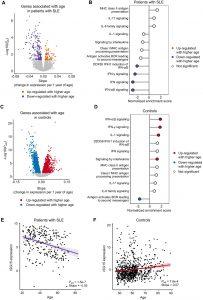Lupus, a chronic autoimmune disease, often strikes hardest in early adulthood, when the immune system mistakenly attacks the body’s own organs. But unlike most chronic illnesses, lupus symptoms can ease dramatically with age. New research may have uncovered why.
At the centre of lupus pathology is a hyperactive interferon response, a set of antiviral defences that become misdirected and cause widespread inflammation. This immune overactivity can lead to complications in the kidneys, heart, skin, and more.
In a new study published researchers found that interferon-related gene activity declines with age in lupus patients (Figure 1).

Figure 1: Aging associates with reduced IFN gene expression in patients with SLE but not healthy controls. (A) Volcano plot highlighting genes with significant (Padj < 0.05) age-related changes in expression in patients with SLE (n = 271), treating age as a continuous variable. P values were calculated using the limma package and adjusted with the Benjamini-Hochberg method. (B) GSEA demonstrating immune-related biological signaling pathways in bulk RNA-seq samples from patients with SLE. Filled circles represent pathways with a Benjamini-Hochberg adjusted P value <0.05. A positive normalized enrichment score value represents up-regulation of the pathway with older age, and a negative value represents down-regulation with older age. MHC, major histocompatibility complex; BCR, B cell receptor. (C) Volcano plot highlighting genes with significant (Padj < 0.05) age-related changes in expression in healthy controls (n = 880), treating age as a continuous variable. P values were calculated using the limma package and adjusted with the Benjamini-Hochberg method. (D) GSEA demonstrating immune-related biological signaling pathways in healthy controls. (E and F) Linear regression assessing relationship between expression of the canonical IFN-stimulated gene ISG15 and age in patients with SLE (E) and healthy controls (F). Expression was measured by log2 counts per million. Slope refers to the change in normalized gene expression per year of age. P values were calculated using limma and adjusted with the Benjamini-Hochberg method.
What the Study Found
- Researchers analysed blood samples from lupus patients of various ages.
- While healthy adults showed a steady rise in inflammatory markers with age (a process known as “inflammaging”), lupus patients showed the opposite trend.
- In lupus, inflammatory genes peak in midlife and then decline, helping explain the reduced disease severity seen in older patients.
- Though still higher than in healthy individuals, interferon activity dropped significantly in older lupus patients.
This study uncovers a new biological explanation for why lupus symptoms ease in older adults and may reshape how we tailor treatments by age. It also challenges conventional ideas about immune aging, showing that even in disease, the immune system’s wiring can change over time—for better.
Journal article: Narendra., R, et al, 2025. Epigenetic attenuation of interferon signaling is associated with aging-related improvements in systemic lupus erythematosus, Science Translational Medicine.
Summary by Stefan Botha










